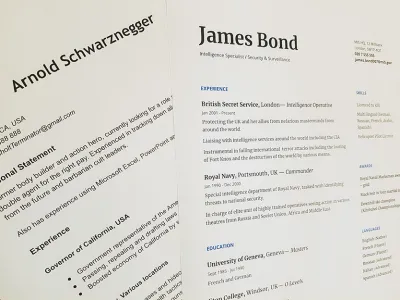
Your Questions, Answered: Careers
This month, we teamed up with REED in Partnership – part of the UK’s largest family-owned recruitment brand – to answer all of your questions on careers and the world of work. We put together a list of the top questions you asked and sent them over for their response. Here’s what they had to say...
How to find a job
How do I find where jobs are listed so I can apply for them?
Looking for a job can seem like a really daunting task if you don't know where to start, but luckily there are so many places for you to start your search and many of them are just a few clicks away! Job sites such as REED make it really easy for you to type in a few words relating to a particular job, plus a location - it will then come up with a list of jobs related to your specific search!
What are your tips for getting a job abroad?
First thing to do is make sure you want to work in a different country and do some research about the country you wish to work in. Ensure your CV is bespoke to the location you wish to travel to and work in, as this will let the employer know you’ve done your research and you’re committed. Ensure you find a job right for you and it’s confirmed before you go out there. And, check to see how fluent you need to be in the local language.
How would you suggest getting into theatre?
Attend good acting classes and continuously search for auditions for non-union members. It’s important to also attend acting workshops and network with as many people as possible, as this can provide alternative and exciting opportunities. A good tip would be to work as an extra on a set to build your experience and reputation in the industry. Learn and master how to nail an audition as they are very tricky and very specific. Expose yourself to available opportunities and try and stay optimistic and diligent.
Interview ADVICE
How would you do a successful interview? What are the top tips?
The key to a successful interview is to be as prepared as you possibly can be. First, gain an understanding of the type of interview it will be. Competency-based interviews are increasingly popular these days, and this type of interview focuses on your skills and abilities. The best way to prepare for this is to think of all the strengths you have relating to the role, and think of examples of how and when you demonstrated this strength. You should also make sure you have researched the company ahead of the interview - make sure you understand what they are all about as this will help you tailor your answers. This will not only show the interviewer that you are prepared and have done your research, but it will also help you understand if the company is one you would actually like to work for! You can find loads more top tips about this in our interview advice article.
CV and application tips
Is it a good idea to put online courses, webinars and voluntary work on my CV even though it isn’t paid and might not be relevant to a future job?
Registering in online education or volunteering shows a great level of personal character and is an impressive and relevant inclusion on your CV. It demonstrates drive and discipline, intellectual maturity, curiosity, and a strong willingness to learn. These attributes are important and are what employees look for in candidates. An employer wants to see that you are willing to go the extra mile because that indicates passion, and passion indicates value.
What should I put in my cover letter?
A covering letter should be as concise as possible - you don't want anything longer than two pages (one is usually better!) as recruiters don't have the time to read through really long documents. You should start by outlining the position you are applying for, and why you think you might be a good fit for the role. You should then continue the letter by responding directly to the person specification that is outlined on the job description - this basically tells you what skills the ideal candidate for the role should have. You should specify how you meet each of the criteria they are looking for, and link everything back to a specific example. For example, if the criteria states they’re looking for "someone who is able to manage time efficiently", you could talk about how you created a timetable to manage your revision in the lead up to exams (only if this actually relates to you!) You want your covering letter to explain why you are the best person for the role, and to do this you have to keep the recruiter's attention, so try not to over complicate it! Take a look at more advice and some of our cover letter templates here.
HOW TO GROW YOUR SKILLS
Do you have any suggestions for free online courses where I can expand my skill set to make me more employable?
It's great that you want to explore courses to expand your skill set - this will definitely help you stand out from the crowd! You can find a huge catalogue of free courses on our website, from food science to healthcare, business management design and animation.
psssst….If you’d like to learn more about writing a great CV, showcasing your skills and interviewing like an absolute pro, then then check out the best advice. Watch it now.

Choosing A career path
I’m not sure what career I might want to get into after school and uni. Where can I find inspiration?
Many students your age will be worrying about the same thing right now, but thankfully there are loads of resources around to support you, including the careers advisor at your own school/college. They should be able to support you in identifying the different careers options that are out there! If this isn't useful however, there are many other places you can find inspiration. Think about speaking to family or friends who work in roles that may appeal to you and ask them about their sector. The key thing to think about is "what do I enjoy?" - base your search off this. You'd be surprised to see how many job roles actually exist, so try to keep your options open.
*psssst….you can also check out our Job Dreams series, where we interview people in loads of different job roles - from comedians to mental health advisors, barristers to architects!
Is there time for multiple careers or should I just stick to one?
This is a great question - many people believe you have to stick to one career choice but this is absolutely not the case! You should definitely be open to exploring different careers and paths - if you know what you want to do with your life and end up following that path, then great! However, as you get older and experience different things, you may very well find that your 'ideal' career changes over the years, and there is nothing wrong with this. It doesn't matter how old you are, there will be time for you to explore different careers if this is something you want!
What career options can we look at after doing NCS?
Literally anything! The skills you gain on NCS are so varied that you are able to use them in any and all occupations. The ability to communicate with people who are different from you is an essential skill you’ll continue to develop as you enter the workforce. Having empathy and stepping out of your comfort zone to express yourself confidently will open so many doors whether you are working in retail, fashion, sports/leisure or even at Number 10. And recruiters love to see NCS on CVs too - They’re going to be immediately drawn to people who have extra curricular experience because of the attributes that it shows about you!
Employee benefits
Can you explain to me why different companies offer different perks and benefits for their employees?
Every company operates in a different way to one another, and it also depends on the sector you are working in. For example, if you work in the corporate world (think banking, law, finance) you are likely to be offered different benefits than if you were working in the charity sector. This is because the ethos and financial outputs from both of these sectors are completely different. Every company is entitled to offer whatever benefits they want, although things such as annual leave are a statutory requirement. It's good to know what the benefits of the company you are applying for are, so you know what you could be getting from them.




